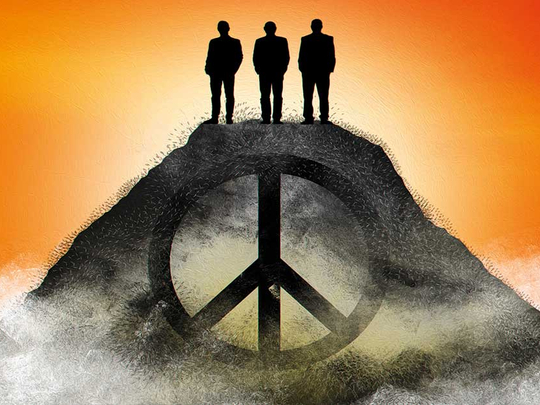
After threatening fire and fury, how does a superpower deescalate? By scrambling its secretary of state, secretary of defence and military chief to reassure foreign leaders that United States President Donald Trump should be taken seriously, not literally. That’s what Rex Tillerson, James N. Mattis and General Joseph Dunford, the US Secretary of State, Secretary of Defence and the chairman of the joint chiefs-of-staff, respectively, have been doing for the past week — and it seems to have worked.
Only eight days ago, Trump had warned that if North Korea made any more threats against the US, he’d unleash “fire and fury like the world has never seen”. Mattis quickly clarified that the US red line would be an actual military attack, not verbal assaults. Only five days prior to that, Trump had sounded ready for battle, tweeting that US forces in Asia were “locked and loaded”. However, Dunford, on a visit to Korea, lowered the temperature. “We’re all looking to get out of this situation without a war,” he said.
And perhaps there won’t be one, after all. Last Monday, North Korea’s leader, Kim Jong-un, backed down, announcing that he had decided to “delay” his plans for a missile strike on Pacific Ocean waters near the US territory of Guam.
A win for the theory that a US president can get his way simply by scaring the bejesus out of the rest of the world? Not necessarily. US officials argue that the credit should go to Mattis’ blunt clarity, Dunford’s reassuring steadiness and Tillerson’s patient diplomacy. To them, Trump’s incendiary tweets actually got in the way. Even some Democratic foreign policy experts are willing to give the Trump administration kudos for making headway on one of the world’s most intractable problems.
“There’s a fairly considered policy running underneath all that noise,” Ely Ratner, a former adviser to former US vice-president Joe Biden, said. “They’re pursuing a maximum pressure strategy with a sanctions regime that is unprecedented ... I think we’re heading down the right road.”
The key to the strategy, aimed at stopping North Korea from building a nuclear weapon that can strike the US, has been a persistent campaign to woo China, North Korea’s powerful neighbour and trading partner, to Trump’s side. Economic and military pressure on North Korea won’t work unless the US and China are working together. That’s why the most important US success in the last few weeks wasn’t Kim’s stand-down on Guam; it was China’s decision to support and enforce new and tougher trading sanctions against North Korea.
Those decisions stemmed from Trump’s success in convincing Chinese President Xi Jinping that the Korean problem should be a top priority for both countries — and that China could reap rewards in trade negotiations with the US if it cooperates. The drive to enlist Xi’s help also included conciliatory signals from Mattis and Tillerson, who said the US was willing to negotiate with North Korea, which China wants, without tough preconditions such as a complete halt to the nuclear programme. “The US has no interest in regime change or accelerated reunification of Korea,” Mattis and Tillerson wrote in the Wall Street Journal last week. “If China wishes to play a more active role in securing regional peace and stability — from which all of us, especially China, derive such great benefit — it must make the decision to exercise its decisive diplomatic and economic leverage over North Korea.”
The next big decisions may come this autumn, when Trump is scheduled to meet Xi in Beijing. China experts believe Xi would like to show significant progress on the Korea problem then. And that will touch off new debates inside the Trump administration. What concessions is the US willing to make to induce North Korea to consider ending, or at least freezing, its nuclear programme? And if Kim won’t give up his weapons, as experts anticipate, is the US ready to adopt a policy of “containment”, hoping to deter a nuclear North Korea from ever using them?
The administration’s answer, so far, is ‘no’. But in the long run, even with China’s help in imposing sanctions on North Korea, it may have no choice. “Deterrence is not desirable,” said Jeffrey A. Bader, an Asia expert who worked on former US president Barack Obama’s National Security Council staff. “It’s inadequate in the face of a regime like North Korea’s. It sounds passive, and no administration wants to look passive. But it’s what you’ve got left if everything else fails. Come back in four years, and I’ll bet that’s where we are.”
Still, containment’s better than a “hot” war, especially a hot nuclear war. Give the American president and his aides some credit — especially Mattis, Tillerson and Dunford — for building a ladder to help their boss down from the limb he climbed on.
— Los Angeles Times
Doyle McManus is a columnist for the Los Angeles Times.








